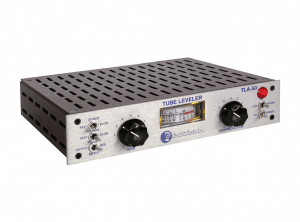What is a Leveling Amplifier?

In the family of dynamics processors, the leveling amplifier is lesser known middle child between the compressor and limiter. Among many pro studios, however, it’s a considered an excellent tool in mastering arsenal.
Like a compressor or limiter, the role of a leveling amplifier is to reduce the dynamic range of track. In other words, it makes the difference between the loudest part of a track and the quietest smaller. This makes the mix sound richer and makes for more comfortable listening experience.
Leveling Amplifier vs. Compressor
In many ways a leveling amplifier is the predecessor to the compressor, which has led some to say that the two terms are interchangeable. But, as compressors developed over time they allowed for more control over parameters like ratio and threshold. A leveling amplifier still has basically two knobs: gain and peak reduction.
The compressor and limiter reduce dynamic range by tapering off the louder parts of the track that exceed a given loudness threshold. How aggressively, how quickly and for how long that loudness is reduced is determined by the adjusting the ratio, attack and release parameters. When the track doesn’t exceed the dynamic threshold, a compressor or limiter won’t kick in at all.
A leveling amplifier is different in that the ratio, attack and release parameters are internally fixed. They other difference is that it automatically amplifies the signal to make up for what’s lost dynamically in the compression. In this way, it is always leveling the track as opposed to how a compressor/limiter are only processing when the track is louder than the threshold.
Leveling Amplifier Specs
Typically, a leveling amplifier has a fixed ratio of somewhere near 5:1. It falls between the a limiter, which is often around 10:1, and a compressor, which can start around 2:1. A leveling amplifiers’ attack is usually very short (around 10 milliseconds) and the release is nonlinear and relatively longer which effectively keeps it in a state of active processing.
In terms of how leveling amplifiers sound compared to compressors, it’s really a matter of taste. Leveling amplifiers traditionally are used on vocals and acoustic guitars, but many producers will run a stereo bus of the their mix through one to “glue” everything together.
With only two knobs, the appeal of a leveling amplifier is that you can often dial in the sound you want without a ton of tweaking. This means that for mixing and mastering, a leveling amplifier can be a major asset to putting the final touches on your track. If you can afford it, we recommend you pick one up for your studio. It will likely become one of your favorite pieces of gear.




